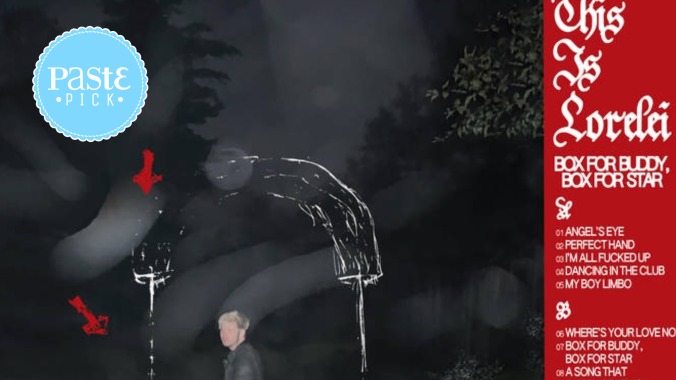This is Lorelei Gets Earnest on the Beautiful Box For Buddy, Box For Star
On his solo project’s latest record, Water from Your Eyes multi-instrumentalist Nate Amos sheds off the scrappy skin of his previous efforts and creates his most accessible, mature, and focused work yet.

With every album by This is Lorelei, the solo project of Brooklyn-based musician Nate Amos, you never really know what you’re gonna get. Across a decade of making music, he’s dabbled in everything from twangy Americana and hyperpop to hazy lo-fi and psychedelia. Each listen is a dive into Amos’s hyperactive, uninhibited mind, a sonic playground whose sprawling, multifaceted design leaves you more invigorated than exhausted. Even Water from Your Eyes, his experimental pop band with vocalist Rachel Brown, offers an exciting glimpse into how easily and deftly he’s able to traipse from one idea to the next. No wonder the Beatles’ The White Album was a formative record for him; the 1968 LP’s hopscotching between different themes and sounds seems to have informed Amos’s interest in avant-garde experimentation.
The endless exuberance and unpredictability that define Amos’s style are especially prominent on his latest record, Box For Buddy, Box For Star, where he continues to hone in on his artistic versatility by dialing into a more earnest, singer-songwriter wavelength. In contrast to his earlier work, which is looser and scrappier in construction and concept, the 10-track Box For Buddy is tight and polished yet brims with the same nimble energy as the rest of his formidably abundant discography. Amos is still tinkering with different genres here—namely, mid-Aughts indie rock, folk, country and synth-pop—but he brings a much sharper focus to this material than anything else he’s done. All the pieces of the playground are still there, just a little more renovated.
Amos’s straightforward approach results in a record that is both striking in its simplicity and downright seamless in its execution, allowing space for his desire to play around and be vulnerable in a way that he hasn’t before. The excellent, poignant opener “Angels Eye,” for instance, is a tender acoustic ballad that mines genuine gravitas from its lyrics on loss and loneliness and cheeky humor from Amos’s use of pitch-shifting, turning it into an endearing and amusing duet with himself. Such clever tonal interplay also recalls Rocket-era Alex G, another prolific, genre-fluid indie artist unafraid to subvert expectations.
-

-

-

-

-

-

-

-

-

-

-

-

-

-

-

-

-

-

-

-

-

-

-

-

-

-

-

-

-

-

-

-

-

-

-

-

-

-

-

-








































